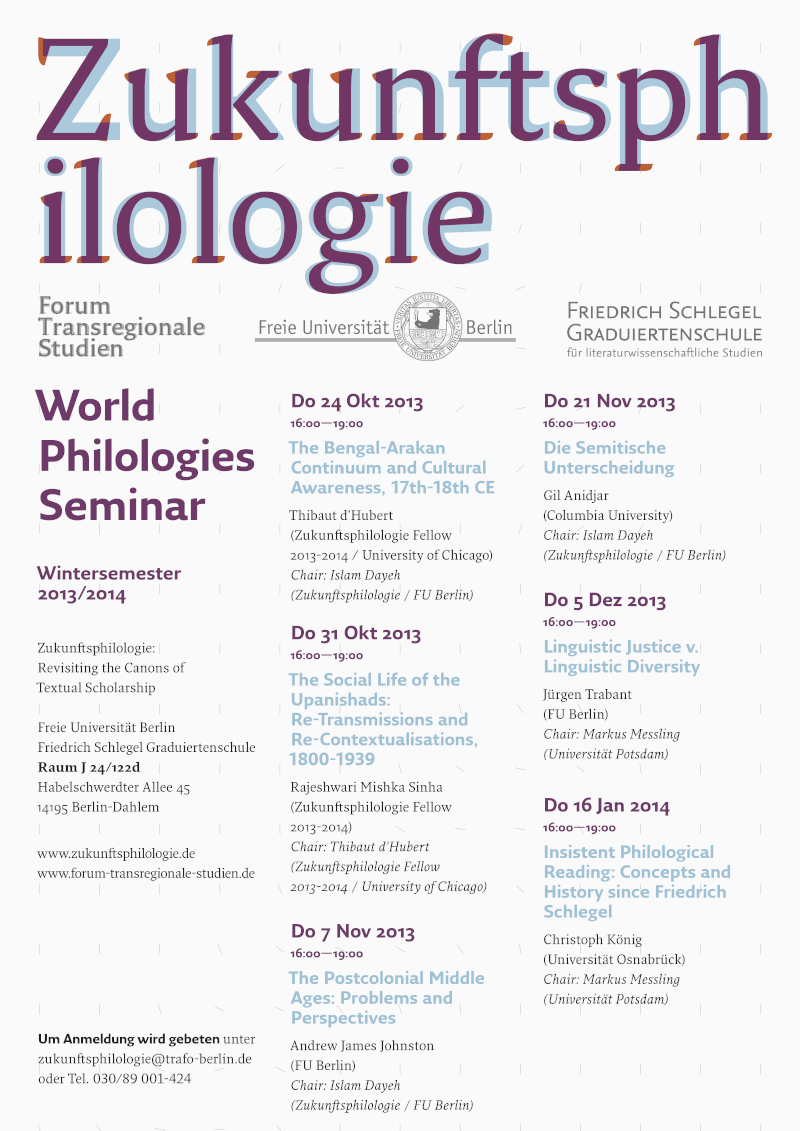The Upaniṣads are a set of originally orally transmitted compositions in Sanskrit associated with the Brahmanical religion and considered to be largely philosophical - rather than ritualistic or didactic - in nature. The literature comprising the Upaniṣads forms a broad and varied class of material comprising between ten, and sixty or more titles; their dates of composition range from possibly the Pre-Buddhistic to the medieval and early modern period. The Upaniṣads, like the Vedas were frequently privileged by nineteenth century commentators, including western Sanskritists - such as F. Max Müller, and reformist-minded Hindus - such as Vivekananda, over later material, as "purer" examples of "Hinduism" because closer to the "original" Vedic religion.
The Social Life of the Upanishads: Re-Transmissions and Re-Contextualisations, 1800-1939
Rajeshwari Mishka Sinha (Zukunftsphilologie Fellow 2013-2014); Chair: Thibaut d'Hubert (Zukunftsphilologie Fellow 2013-2014/ University of Chicago)
Freie Universität Berlin, Raum J24/122d, Habelschwerdter Allee 45, 14195 Berlin

From the late eighteenth century, these compositions, like the Mānavadharmaṣāstra and Bhagavadgītā, began to be translated into European languages. The translations were made by Europeans, such as A.H. Anquetil Duperron (1801-2) and Indians, such as Ram Mohun Roy, whose English translations (1816-1819, 1832) were published in India, London and the United States. In the twentieth century collaborative translations between eastern and western interlocutors, such was The Ten Principal Upanishads by W.B. Yeats and Purohit Swami (1937) garnered popular as well as scholarly interest. Such translations also often endowed the Indian translator with a special authority upon his return, to speak on the "eminent texts" of "Hinduism", to South Asian audiences having successfully done so in the west.
Although there were translations into other languages not of South Asian origin, such as Arabic and Persian, which pre-date the European versions, it was the production and circulation of the latter that resulted, as in the case of the Bhagavadgītā, in the transformation and re-configuration of the potential cultural meanings, ideological status, aesthetic merit, philological importance, and religious significance of the Upaniṣads in the modern period. This was true not only in the west, but also, through their re-transmission in translated, redacted, reconstructed and recontextualised forms, in South Asia.
The social life of the Upaniṣads and its cultural, intellectual and material transformation through its transmission and retransmission across cultural boundaries is relatively unexplored by scholars. Studies of the Upaniṣads that engage with its cross-cultural transmission are focussed on its literary and spiritual reception in the west and the impact on selected twentieth-century western poets and intellectuals. However the transformative process through which the Upaniṣads entered, in a sense, a new social life-world, through specific translations and publications, academic systems and syllabi, cultural and commercial networks, and dissemination through the travels and tours of individuals who undertook its dissemination, has not been analysed. Equally, the re-transmission of the Upaniṣads to their "original" context in South Asia and the altered structures of significance and communities of meaning that they acquired and were imbricated within upon their return, remain understudied.
Seminar Text:
Handout
Rajeshawari Mishka Sinha was educated at St. Xavier's College, Bombay, the University of Oxford, Emory University and the University of Cambridge. She was a Research Associate at the Centre of South Asian Studies, Cambridge from 2012 to 2013. She is currently revising her doctoral thesis on the history of the transmission of Sanskrit in Britain and America, 1832-1939 for publication. Her article on the transnational translation of the Bhagavad G?t? was published in Modern Intellectual History in 2010, and in Kapila and Devji (eds.), Political Thought in Action: The Bhagavad Gita and Modern India (CUP, 2013). Her chapter on American Orientalism and Modern Scholarship, 1836-1894 will be published in Elmarsafy, Bernard, Atwell (eds.), Debating Orientalism (Palgrave Macmillan, 2013). Her research interests include the intellectual history of orientalism and the cross-cultural transmission of ideas, the transnational material and intellectual history of oriental publishing, the occult as a metamorphosing category of knowledge in the 19th century, and literary Modernism. She uses Bengali, English and Hindi as a native speaker and has studied Sanskrit and German at an advanced level.

